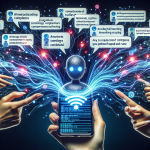Introduction: The Evolution of Content Marketing
Content marketing has undergone a significant transformation over the past decade. In 2025, artificial intelligence (AI) is no longer just a buzzword—it’s a powerful tool reshaping how brands create, distribute, and optimize content. From automating blog posts to personalizing customer experiences, AI is revolutionizing every aspect of content marketing.
AI-Powered Content Creation
One of the most remarkable advancements is AI’s ability to generate high-quality content. Today’s sophisticated natural language generation (NLG) tools can write blog articles, product descriptions, and social media updates that rival human authors. By training on massive datasets and learning from user interactions, AI tools like OpenAI’s GPT series and others have become adept at producing context-rich, engaging content in various tones and styles.
Benefits:
- Faster turnaround time
- Cost-effective production
- Language and tone customization
Enhanced Content Strategy Through Data Analysis
AI excels at analyzing vast amounts of data to uncover patterns and trends. In content marketing, this capability enables brands to build informed strategies based on real-time insights. AI tools can analyze customer sentiment, user behavior, SEO trends, and competitor performance to recommend optimal content topics and publishing schedules.
Key Features:
- SEO optimization using predictive analytics
- Audience segmentation and persona building
- Performance forecasting
Content Personalization at Scale
Personalization has become a cornerstone of effective content marketing. In 2025, AI enables brands to deliver hyper-personalized content experiences to individual users at scale. By analyzing data from CRMs, browsing history, and social media, AI tools tailor content recommendations, email campaigns, and ad copy in real-time.
Examples Include:
- Dynamic website content based on user behavior
- Email subject lines optimized for individual recipients
- Content recommendations in mobile apps and platforms
Voice and Visual AI in Content Creation
Beyond text, AI is also impacting voice and visual content. Tools powered by speech recognition and computer vision are enabling marketers to create and enhance podcasts, videos, and images like never before. AI can now edit videos, generate visuals, transcribe audio content, and even provide lifelike voiceovers—all within moments.
Use Cases:
- Automated video editing for social media
- AI-generated infographics and visuals
- Natural-sounding synthetic voiceovers
Real-Time Content Optimization
AI allows marketers to optimize content performance in real time. By monitoring user interaction data, bounce rates, and engagement statistics, AI tools can suggest modifications to titles, keywords, CTAs, and content length to boost performance instantly.
Real-Time Insights Offer:
- A/B testing for headlines and calls-to-action
- Live SEO adjustments
- Audience re-targeting based on engagement
Ethical Considerations and Human Oversight
As AI becomes more integrated into content marketing, ethical and creative concerns are also rising. Ensuring transparency, mitigating bias, and preserving brand voice require human oversight. While AI handles the heavy lifting, human marketers are essential for strategic thinking, quality control, and fostering genuine emotional appeal.
Considerations Include:
- Maintaining authenticity
- Preventing misinformation
- Regulatory compliance and data privacy
Conclusion: Human Creativity Meets Machine Intelligence
In 2025, AI is not replacing content marketers—it’s empowering them. By automating repetitive tasks, uncovering insights, and enhancing personalization, AI allows professionals to focus on what they do best: storytelling, strategy, and creativity. The synergy between human ingenuity and artificial intelligence is shaping a more data-driven, personalized, and impactful future for content marketing.






